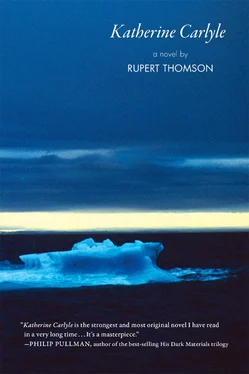For the rest of the day I pretend to be the tourist he took me for, spending the afternoon at a gallery. Later, in the shop, I buy a notebook with unlined pages and several Gerhard Richter postcards. His blurred portraits seem a comment on my own existence, all the unimportant details stripped away.
By five-thirty I’m back in Walter-Benjamin-Platz. This time I notice the hexagonal green kiosk at the east end of the square. As I approach Klaus Frings’s building a man of about seventy steps out, his white hair gathered in a ponytail. I slip past him, into the lobby. Behind a desk of blond wood is a man in a gray uniform, his newspaper open at the sports pages.
“Good evening,” I say. “Is Herr Frings at home?”
The porter looks up. “He’s not back yet.”
I glance at my watch.
“He should be here in half an hour or so.” The porter’s gaze drops to my breasts. “Would you like to wait?”
I shake my head. “Thanks all the same.”
Out in the square again I lean against the kiosk. The sky has clouded over and a damp wind is blowing. It’s beginning to get dark. During the next thirty minutes only two people enter the building. The first is a middle-aged woman cradling a pug in the crook of her arm. The second is the man with the ponytail.
At ten past six a tall figure turns out of Wielandstrasse and into the square, passing within an arm’s length of me. He wears a fawn overcoat and is carrying a leather briefcase. Instinctively I know it’s Frings, even though he looks nothing like the person I imagined. I wait until he’s about to open the door to his building, then I call his name. He jerks to a halt, then turns slowly. Standing between two of the pillars that form the arcade, he peers out into the dark.
“Hallo?” he says.
My heart somersaults. He responded to the name!
“Valentina?”
Valentina . She must be the girl who left him. But would she really wait in the dark for him to come home from work? Surely not — especially if she was the one who ended the relationship. It’s more likely that he is upset at having been rejected and can’t stop thinking about her.
“Valentina? Is that you?”
I flatten myself against the kiosk and keep quiet. Since he only heard his name called once, I’m hoping he will think he imagined it. A sound carried on the wind, a voice inside his head … He looks right and left, then swings round and vanishes into the building. I pray the porter doesn’t mention me. The last thing I want is for Klaus to learn that a foreign-sounding girl has been asking for him. I need to come from nowhere, like an apparition. Like a gift.
Like a reward.
/
The next morning I’m in Walter-Benjamin-Platz at half past six. I have no idea when Klaus leaves for work and I don’t want to miss him. It’s still dark and the air has a bitter, coppery smell that is faintly sulfurous, like burnt matches. The layout of the square proves useful. I take up a position on the south side, behind a pillar. Once in a while I walk out onto Wielandstrasse, but never so far that I lose sight of the glass front door and its upright rectangle of yellow light.
I have been waiting for about an hour when Klaus appears, his head lowered, his face illuminated by the small screen of his phone. He turns right, towards Leibnitzstrasse. He’s dressed in the same fawn coat and carrying the same leather briefcase. I can’t help smiling. It’s as if he understands what is required of him — that he needs to be immediately recognizable — and is cooperating.
He has long legs and he walks fast. Every now and then I have to break into a run, otherwise I might be left behind. He stops at a kiosk to buy a paper. I hang back, feigning interest in a shop window. The air is fuzzy, pixelated, like a kind of interference. A row of cars trembles at the lights.
On Giesebrechtstrasse he hurries across the road and disappears into a café-konditorei . From the pavement I watch him talking to the waitress. They seem to know each other. Her dark hair is piled messily on top of her head, and the top three buttons of her black cardigan are undone, showing off her cleavage. She has a sloppy, sensual look about her, as if she just got out of bed. Does Klaus find her attractive? I push the door open. The waitress looks round. Her instant, natural smile surprises me. I took her for one of those women who reserve all their seductive energy for men.
I sit by the wall and order a coffee and a croissant, then I take out my notebook and my pen. Klaus has chosen a table in the middle of the café, and is partially obscured by a woman eating a slice of cake with a fork. Klaus shakes his paper open. This is the closest we have ever been, and once again I wonder what I want from him. Absorbed in the Frankfurter Allgemeine , Klaus remains quite unaware of me.
I make a quick sketch of his head. His eyes are too small for his face, and his lips have a plumpness that could seem either generous or sulky, depending on his mood. His hair, which is wavy and light brown, starts high up on his forehead. Afterwards, I jot down a few simple observations. His hands are large and workmanlike, not elegant at all, though he takes good care of his nails, which are filed straight across and show no sign of being bitten. His glasses, which he removes whenever the waitress speaks to him, have turquoise frames. They look expensive. He wears a watch, but no rings. I estimate his height at one meter ninety, his weight in the region of eighty-five kilos. If I had to guess his age I would say mid- to late thirties.
I sip my coffee. Something about his appearance disturbs me. It’s true that he in no way resembles the Klaus Frings of my imagination, but that’s not it. No, what I find unsettling is that, even though I have now set eyes on him, he still feels like a made-up character. When I first heard his name — in another city, fifteen hundred kilometers away! — I saw him not as a real person but as an opportunity, a trigger. That feeling persists. To be in the same room as him, to have narrowed the distance so dramatically — to have discovered that he actually exists : it’s hard to believe I’ve managed it. But somehow there’s a gap between the idea of Klaus Frings and the man himself.
/
The clock ticks heavily, sumptuously. Though Klaus Frings has left the café I can’t seem to move. I see my father lying on his back in an air-conditioned hotel room, hands linked behind his head. His eyes are open. His flak jacket, his dusty desert boots …
I whisper in his ear. I’ve gone .
If people love you enough, can they hear you?
He has been up all night, traveling with an aid convoy. Endless checkpoints, everyone on edge. Young boys with semiautomatics. His room is tinted with the first lurid flush of dawn. Through the sealed window comes the metallic wail of the muezzin. He’s so tired that he can’t sleep.
I’m not here anymore. I’ve gone .
In front of the window is a round table and two chairs with low backs. On the table is a half-empty bottle of brandy and two water glasses. One of the glasses has a smudge of lipstick near the rim. Once, a few hours after my father returned from covering a story in Eritrea, I heard him arguing with my mother. She was accusing him of having an affair. He was denying it.
He sits up, puts his feet on the floor and rubs his face with both hands, then he reaches for the phone and dials my number. The screen on my phone lights up. Rocks and sludge. A few tin cans, a bicycle wheel. A woman’s shoe. What happens when you call a phone that is lying at the bottom of a river? Does it sound as if it has been switched off? Does it sound dead?
My father calls, and I don’t answer. He thinks nothing of it. I’m busy or else I’m talking to a friend. Or maybe I lost my charger. But what if he tries again tomorrow, and I’m still not answering? And then again, the day after? What will he think when he keeps failing to get hold of me? How long before it occurs to him that something might have happened?
Читать дальше












